
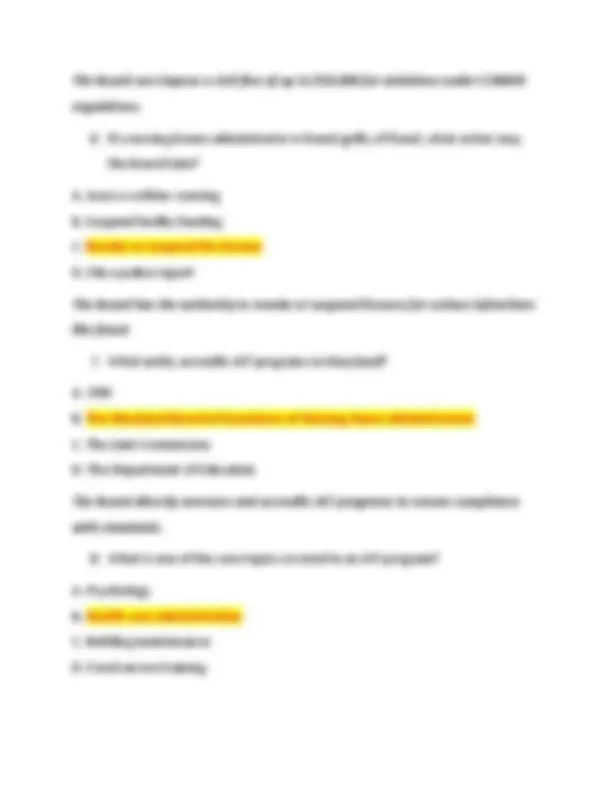
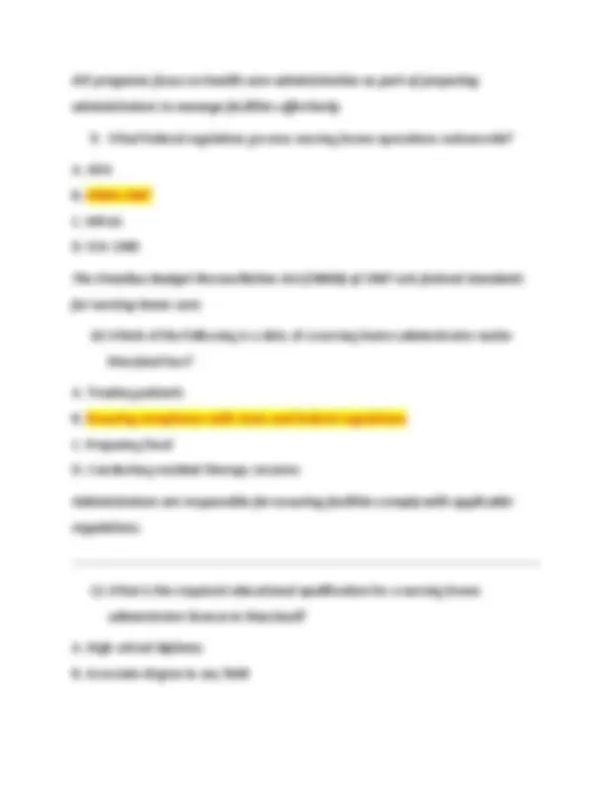
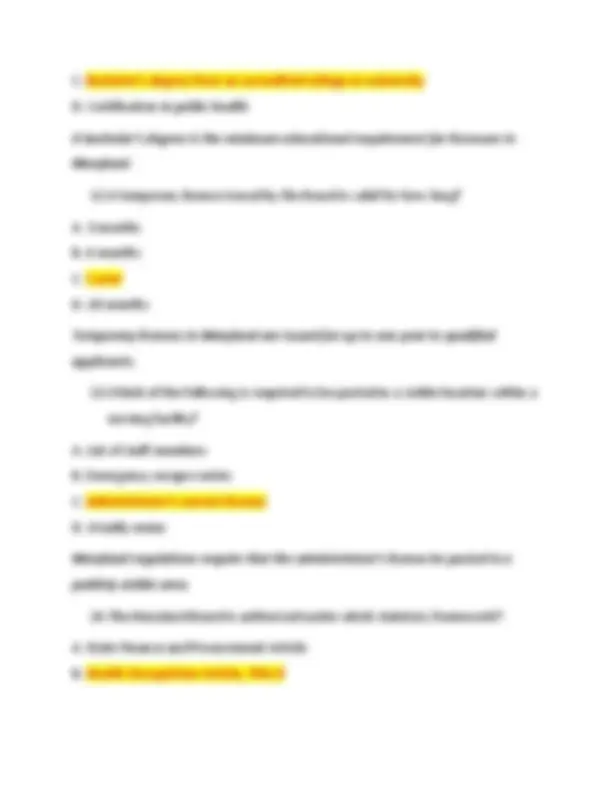
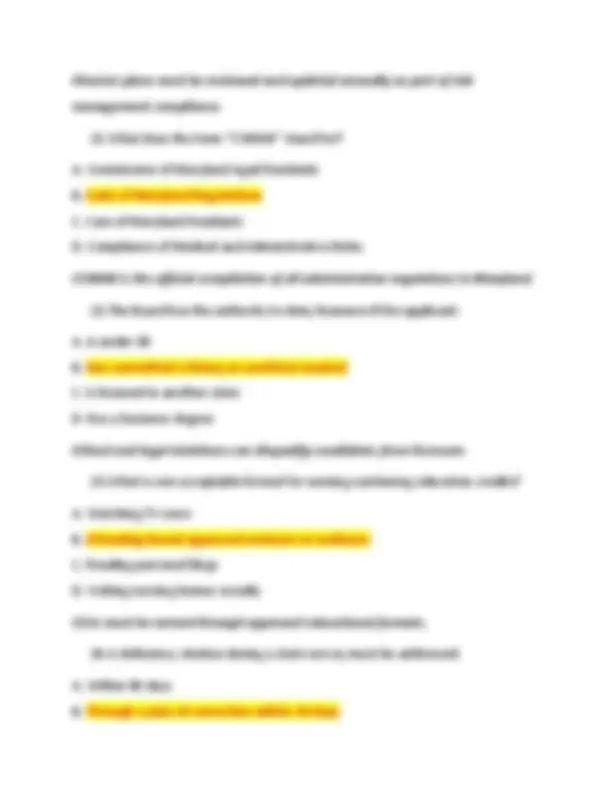
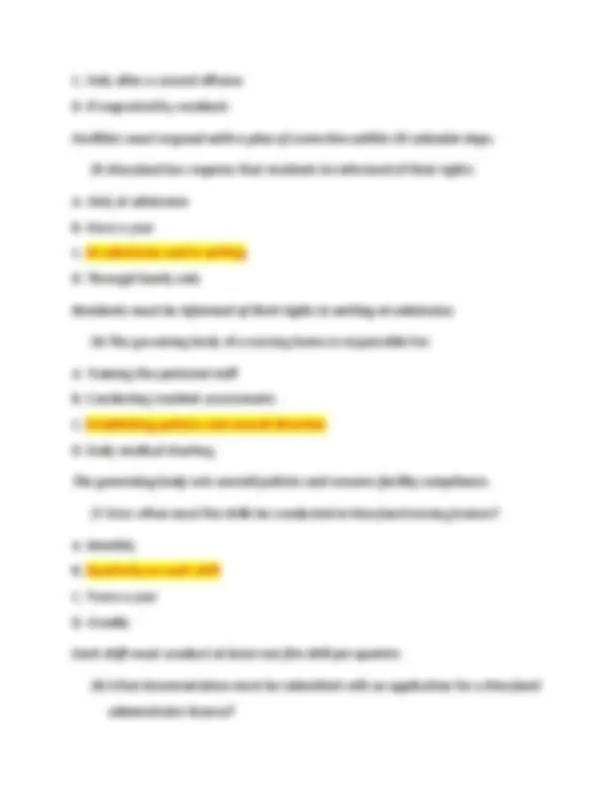
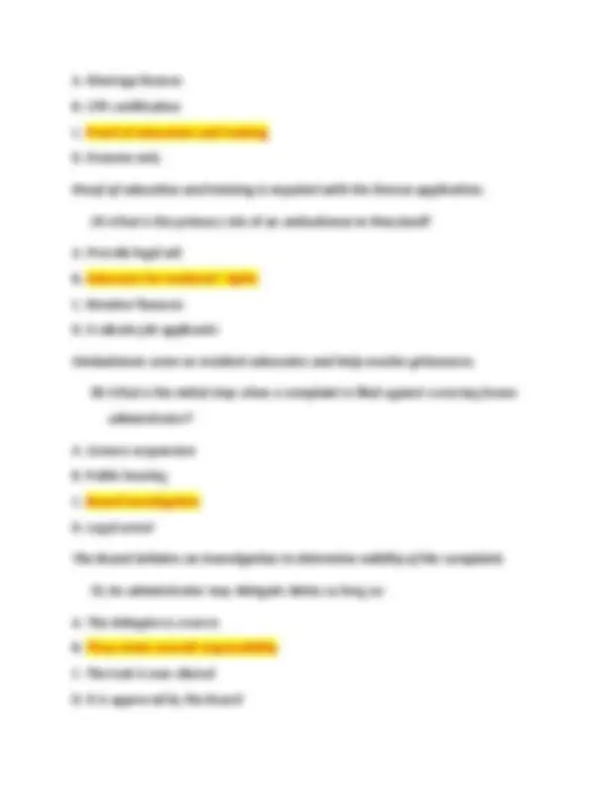
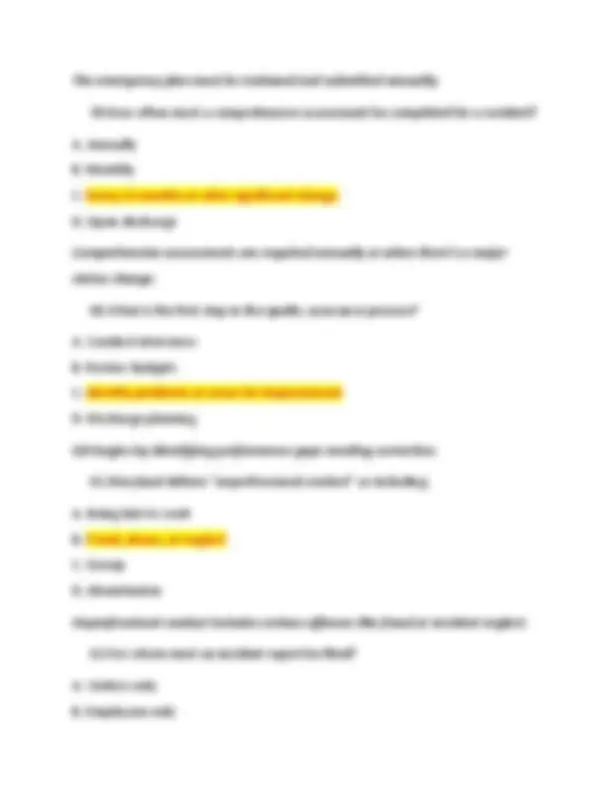
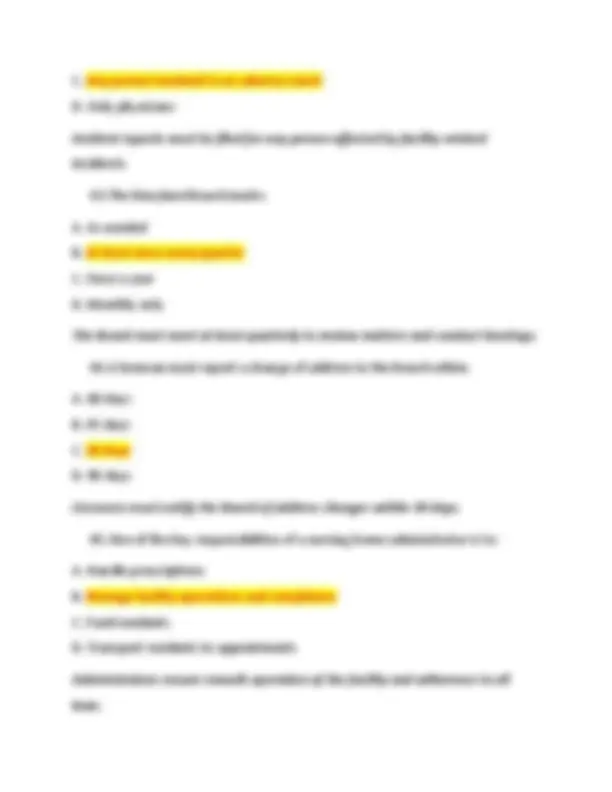
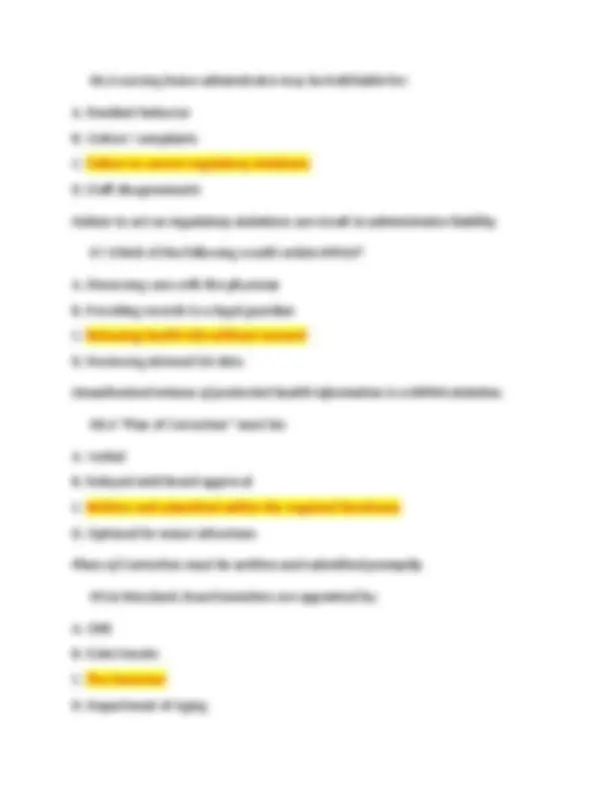
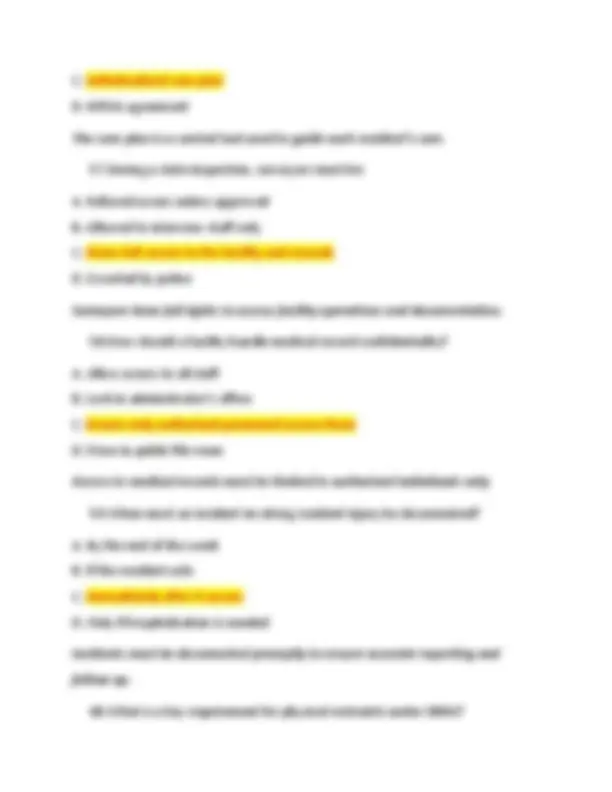
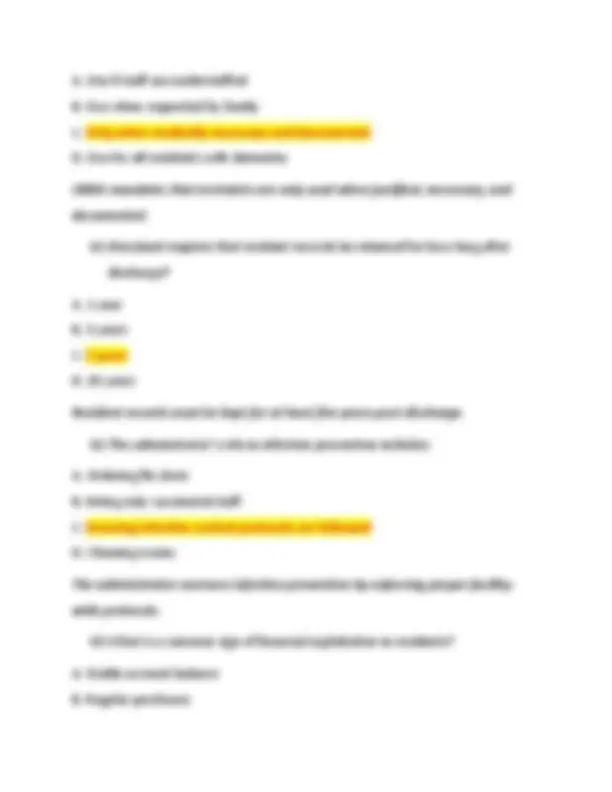
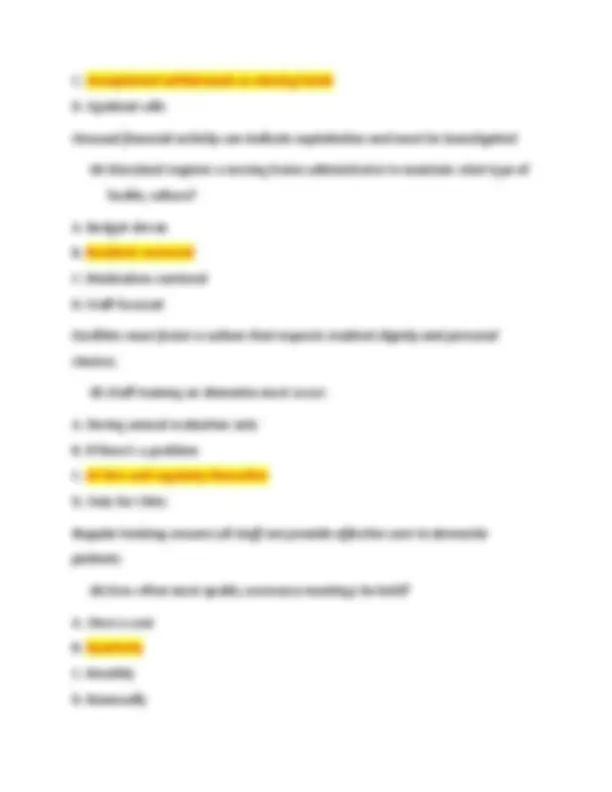
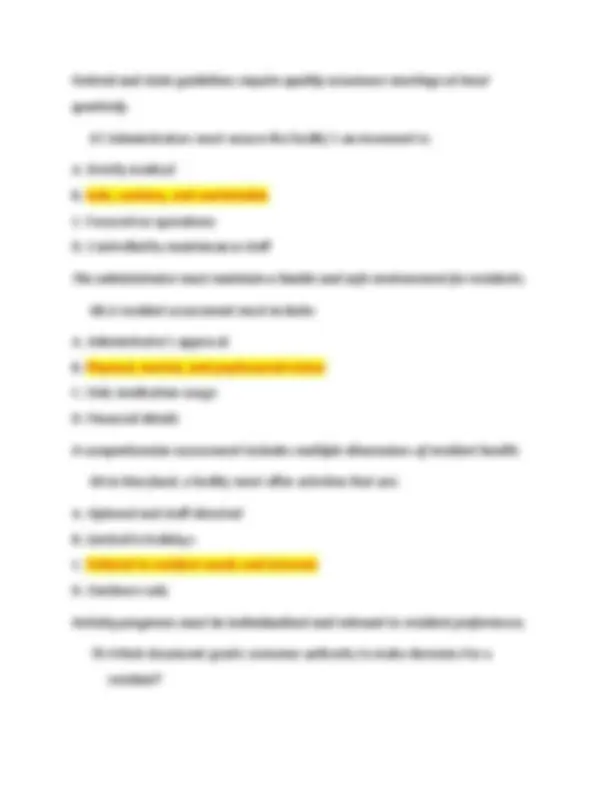
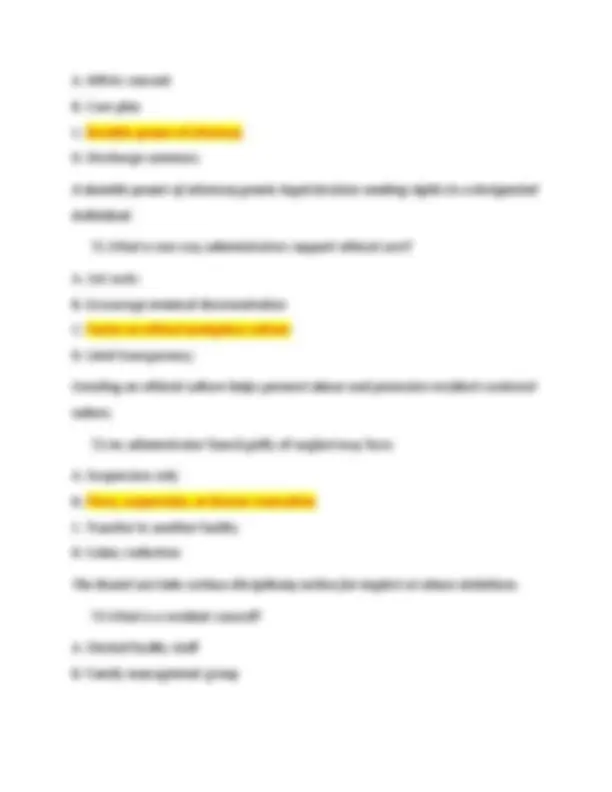
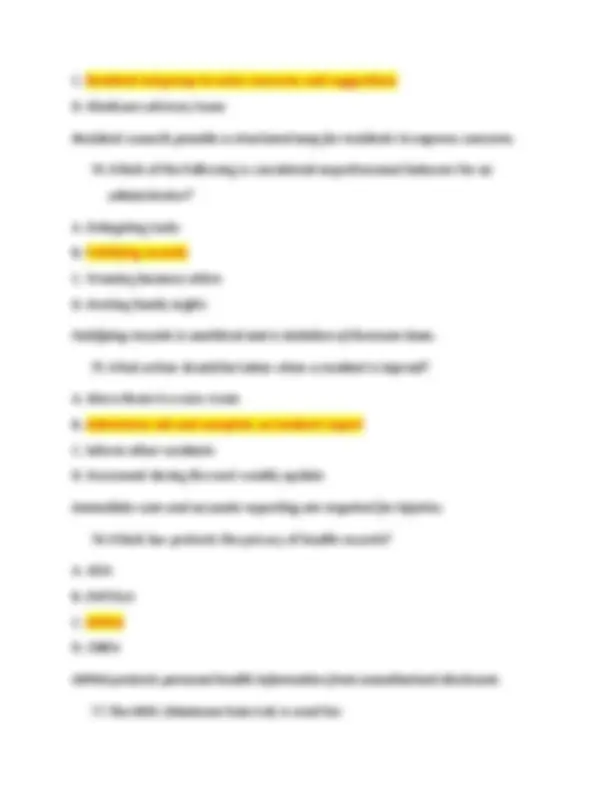
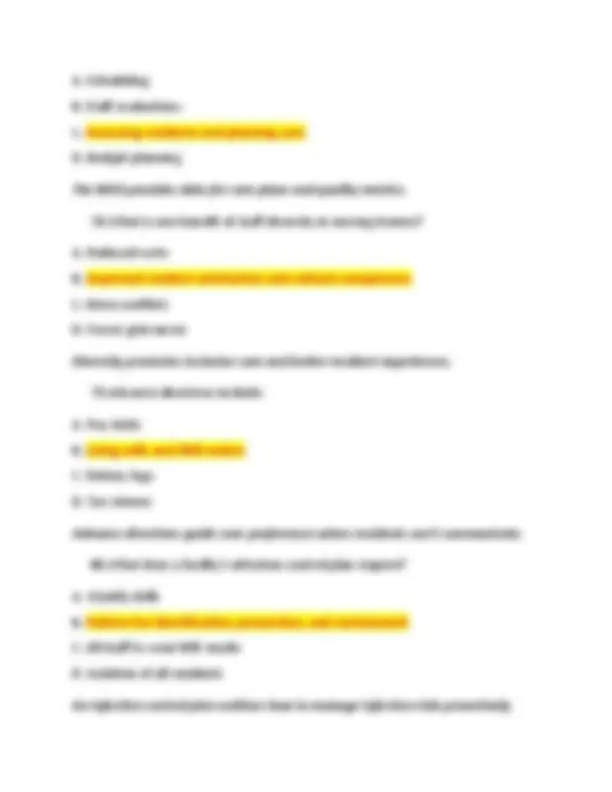
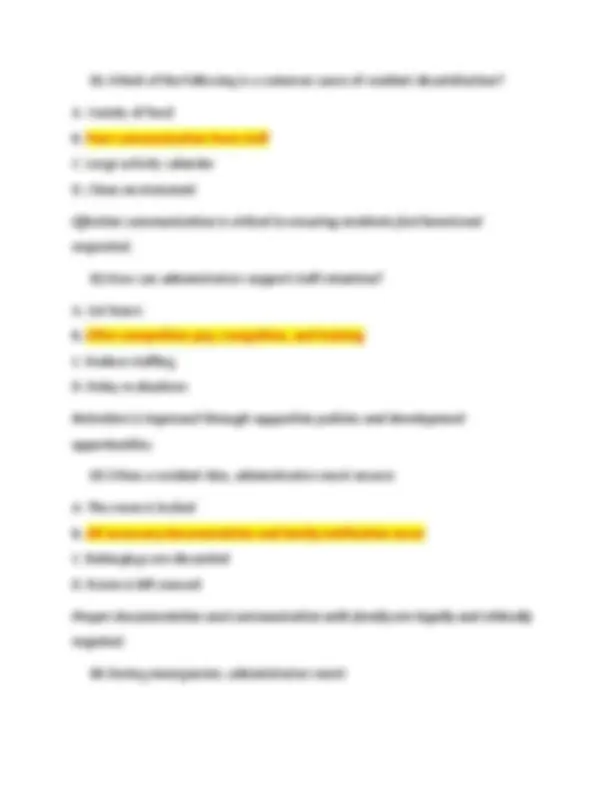
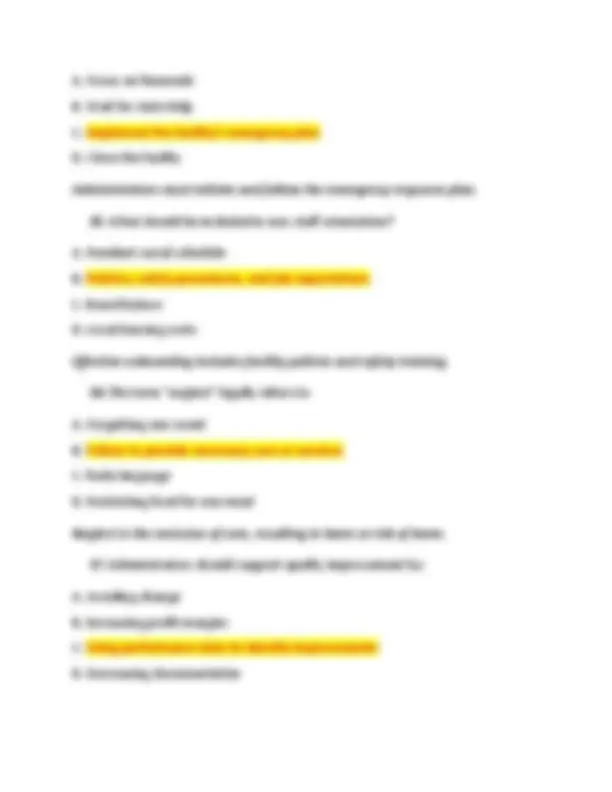
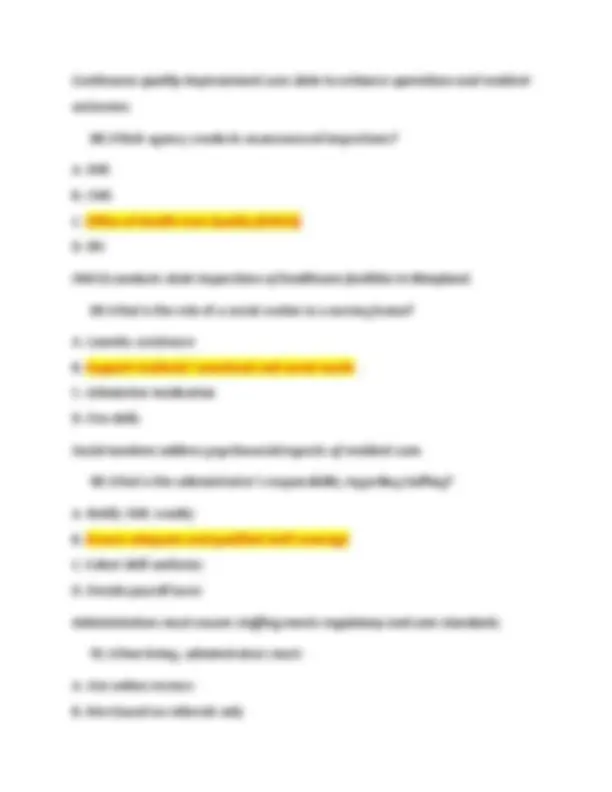
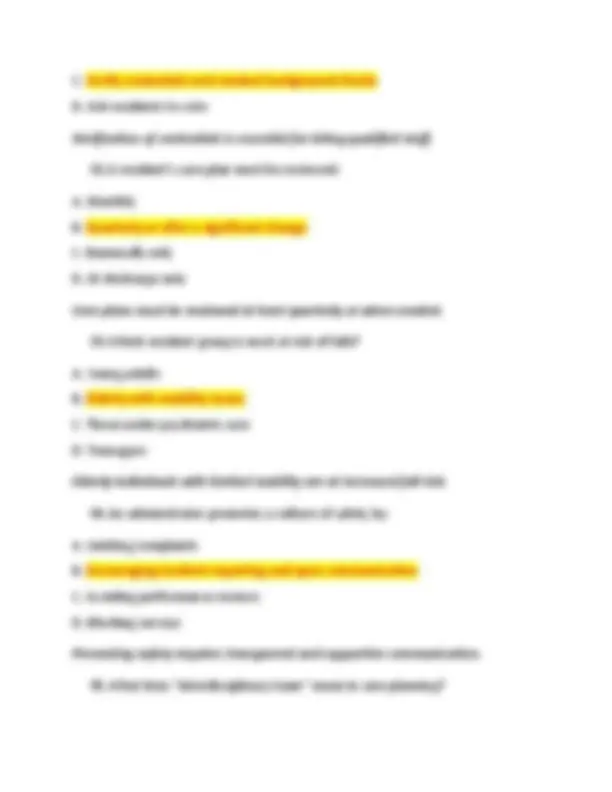
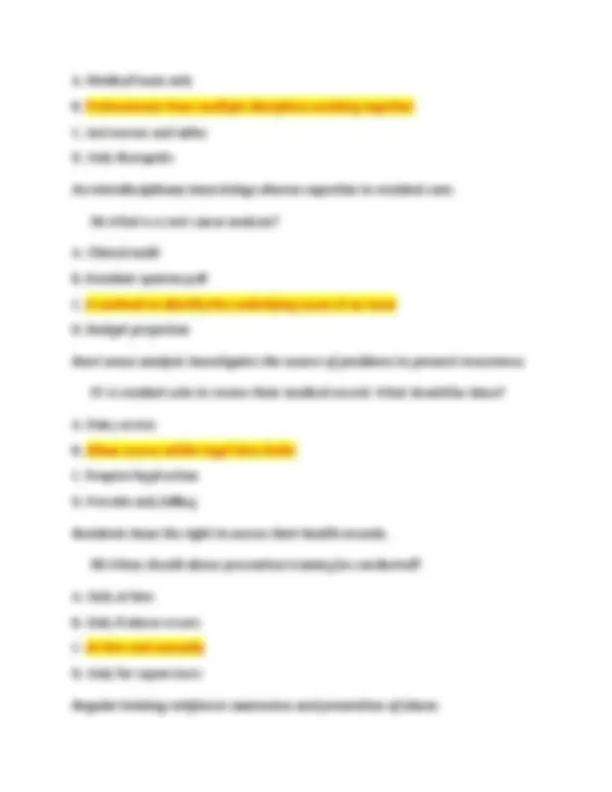
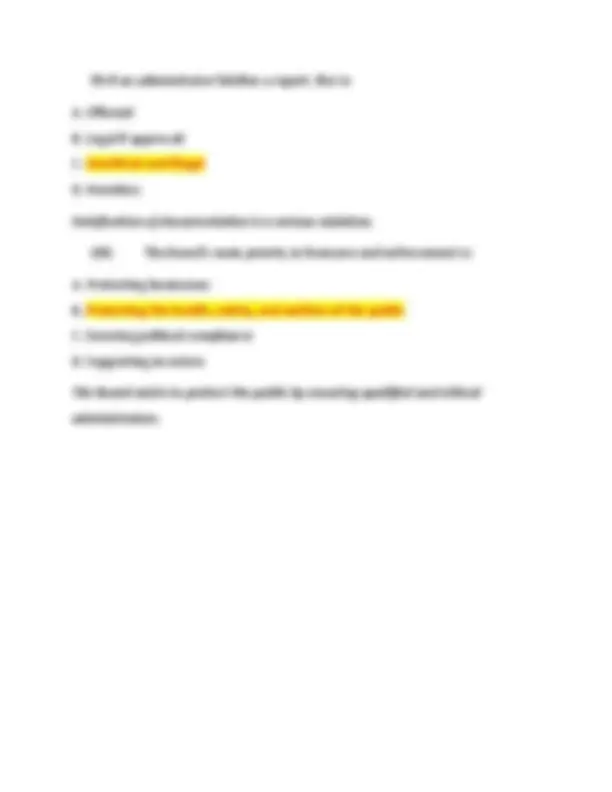


Study with the several resources on Docsity

Earn points by helping other students or get them with a premium plan


Prepare for your exams
Study with the several resources on Docsity

Earn points to download
Earn points by helping other students or get them with a premium plan
Community
Ask the community for help and clear up your study doubts
Discover the best universities in your country according to Docsity users
Free resources
Download our free guides on studying techniques, anxiety management strategies, and thesis advice from Docsity tutors
Maryland – Department of Health, Board of Examiners of Nursing Home Administrators licensing exam Questions And Correct Answers (Verified Answers) Plus Rationales 2025 Q&A | Instant Download
Typology: Exams
1 / 30

This page cannot be seen from the preview
Don't miss anything!























AIT programs focus on health care administration as part of preparing administrators to manage facilities effectively.
C. Bachelor’s degree from an accredited college or university D. Certification in public health A bachelor's degree is the minimum educational requirement for licensure in Maryland. 12.A temporary license issued by the Board is valid for how long? A. 3 months B. 6 months C. 1 year D. 18 months Temporary licenses in Maryland are issued for up to one year to qualified applicants. 13.Which of the following is required to be posted in a visible location within a nursing facility? A. List of staff members B. Emergency escape routes C. Administrator’s current license D. Weekly menu Maryland regulations require that the administrator's license be posted in a publicly visible area. 14.The Maryland Board is authorized under which statutory framework? A. State Finance and Procurement Article B. Health Occupations Article, Title 9
Administrators in Maryland must complete 40 CEUs every two years to renew their license. 18.What must be done if a nursing home administrator leaves the facility? A. Close the facility B. Notify the Board immediately C. Transfer residents D. Hire a replacement within 3 months Facilities must report changes in administrator status to the Board immediately. 19.The term “administrator-in-training” refers to: A. A licensed administrator with less than 1 year of experience B. A student in a graduate nursing program C. An individual enrolled in a Board-approved internship program D. A temporary consultant AIT refers to an individual completing a Board-approved training program to become licensed. 20.A nursing home’s disaster plan must be: A. Reviewed by the mayor B. Optional for private facilities C. Reviewed and updated annually D. Posted only during winter months
Disaster plans must be reviewed and updated annually as part of risk management compliance. 21.What does the term "COMAR" stand for? A. Commission of Maryland Aged Residents B. Code of Maryland Regulations C. Care of Maryland Residents D. Compliance of Medical and Administrative Rules COMAR is the official compilation of all administrative regulations in Maryland. 22.The Board has the authority to deny licensure if the applicant: A. Is under 30 B. Has committed a felony or unethical conduct C. Is licensed in another state D. Has a business degree Ethical and legal violations can disqualify candidates from licensure. 23.What is one acceptable format for earning continuing education credits? A. Watching TV news B. Attending Board-approved seminars or webinars C. Reading personal blogs D. Visiting nursing homes socially CEUs must be earned through approved educational formats. 24.A deficiency citation during a state survey must be addressed: A. Within 90 days B. Through a plan of correction within 10 days
A. Marriage license B. CPR certification C. Proof of education and training D. Resume only Proof of education and training is required with the license application. 29.What is the primary role of an ombudsman in Maryland? A. Provide legal aid B. Advocate for residents’ rights C. Monitor finances D. Evaluate job applicants Ombudsmen serve as resident advocates and help resolve grievances. 30.What is the initial step when a complaint is filed against a nursing home administrator? A. License suspension B. Public hearing C. Board investigation D. Legal arrest The Board initiates an investigation to determine validity of the complaint. 31.An administrator may delegate duties as long as: A. The delegate is a nurse B. They retain overall responsibility C. The task is non-clinical D. It is approved by the Board
Administrators can delegate, but they remain legally and ethically responsible. 32.A patient’s care plan must be completed within how many days of admission? A. 3 days B. 7 days C. 14 days D. 30 days The care plan must be completed within 7 days per federal and state regulations. 33.When may the Board waive some licensure requirements? A. Always B. For applicants with equivalent military experience C. For applicants over 60 D. For administrators relocating from another city Military experience may qualify applicants for partial waiver of requirements. 34.What is the maximum term for a Board member in Maryland? A. 2 years B. 3 years C. 4 years D. 5 years Board members serve for a maximum term of 4 years. 35.What must administrators ensure regarding resident funds?
The emergency plan must be reviewed and submitted annually. 39.How often must a comprehensive assessment be completed for a resident? A. Annually B. Monthly C. Every 12 months or after significant change D. Upon discharge Comprehensive assessments are required annually or when there's a major status change. 40.What is the first step in the quality assurance process? A. Conduct interviews B. Review budgets C. Identify problems or areas for improvement D. Discharge planning QA begins by identifying performance gaps needing correction. 41.Maryland defines "unprofessional conduct" as including: A. Being late to work B. Fraud, abuse, or neglect C. Gossip D. Absenteeism Unprofessional conduct includes serious offenses like fraud or resident neglect. 42.For whom must an incident report be filed? A. Visitors only B. Employees only
C. Any person involved in an adverse event D. Only physicians Incident reports must be filed for any person affected by facility-related incidents. 43.The Maryland Board meets: A. As needed B. At least once every quarter C. Once a year D. Monthly only The Board must meet at least quarterly to review matters and conduct hearings. 44.A licensee must report a change of address to the Board within: A. 60 days B. 45 days C. 30 days D. 90 days Licensees must notify the Board of address changes within 30 days. 45.One of the key responsibilities of a nursing home administrator is to: A. Handle prescriptions B. Manage facility operations and compliance C. Feed residents D. Transport residents to appointments Administrators ensure smooth operation of the facility and adherence to all laws.
The Governor of Maryland appoints members to the Board. 50.The goal of resident-centered care is to: A. Focus on facility reputation B. Enforce strict regimens C. Promote resident choice and quality of life D. Reduce staff workload Resident-centered care emphasizes autonomy, dignity, and personal preferences. 51.The purpose of a grievance policy in a nursing home is to: A. Allow staff to report coworker issues B. Encourage family donations C. Provide residents a way to report complaints or concerns D. Record staff evaluations A grievance policy ensures residents can safely report complaints without fear of retaliation. 52.What must an administrator do if they suspect resident abuse? A. Wait for further confirmation B. Notify the resident’s family only C. Immediately report to the appropriate authorities D. Ask staff to monitor the situation Maryland law requires immediate reporting of suspected abuse or neglect. 53.The final disciplinary decision in license matters rests with:
A. The complainant B. The Board of Examiners C. The facility owner D. Maryland State Police Only the Board has the authority to issue disciplinary action on licensure. 54.How should a nursing home administrator address frequent staff turnover? A. Ignore the issue B. Evaluate and improve retention strategies C. Increase workload for remaining staff D. Shorten onboarding time Addressing turnover involves strategic management to retain staff and ensure quality care. 55.What is one goal of the federal Nursing Home Reform Act? A. Streamline billing B. Protect residents' rights and quality of care C. Eliminate administrators D. Promote private pay only The Reform Act (OBRA 1987) aimed to improve quality and safeguard resident rights. 56.Which document outlines a resident’s daily care plan? A. Financial report B. Staffing matrix
A. Use if staff are understaffed B. Use when requested by family C. Only when medically necessary and documented D. Use for all residents with dementia OBRA mandates that restraints are only used when justified, necessary, and documented. 61.Maryland requires that resident records be retained for how long after discharge? A. 1 year B. 3 years C. 5 years D. 10 years Resident records must be kept for at least five years post-discharge. 62.The administrator’s role in infection prevention includes: A. Ordering flu shots B. Hiring only vaccinated staff C. Ensuring infection control protocols are followed D. Cleaning rooms The administrator oversees infection prevention by enforcing proper facility- wide protocols. 63.What is a common sign of financial exploitation in residents? A. Stable account balance B. Regular purchases
C. Unexplained withdrawals or missing funds D. Updated wills Unusual financial activity can indicate exploitation and must be investigated. 64.Maryland requires a nursing home administrator to maintain what type of facility culture? A. Budget-driven B. Resident-centered C. Medication-centered D. Staff-focused Facilities must foster a culture that respects resident dignity and personal choices. 65.Staff training on dementia must occur: A. During annual evaluation only B. If there's a problem C. At hire and regularly thereafter D. Only for CNAs Regular training ensures all staff can provide effective care to dementia patients. 66.How often must quality assurance meetings be held? A. Once a year B. Quarterly C. Monthly D. Biannually